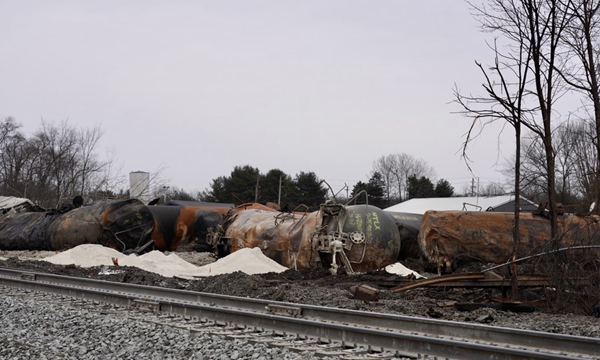

Train wreckage from the Feb. 3 derailment is seen piled up beside the railway on the outskirts of the village of East Palestine,
Ohio, the United States, on Feb. 14, 2023. [Photo/Xinhua]
The chief executive of U.S. transportation company Norfolk Southern said on Thursday that he's "deeply sorry" for the impact of the train derailment in East Palestine, Ohio, in early February. Local residents, meanwhile, are demanding more action.
At a Senate hearing on Capitol Hill, Norfolk Southern CEO Alan Shaw said the railroad "will clean the site safely, thoroughly, and with urgency," noting that the company has committed to reimbursements and investments of more than 20 million U.S. dollars in order to address the impact of the derailment.
U.S. Senator Thomas Carper said the hearing "is an opportunity to put ourselves in the shoes of those impacted by this disaster, examine the immediate response and ensure long-term accountability for the clean-up efforts."
A Norfolk Southern freight train carrying hazardous materials derailed in East Palestine on Feb. 3, which resulted in a significant fire and hazardous materials release in the area.
The U.S. Environmental Protection Agency (EPA) said last week that it will require Norfolk Southern to test directly for dioxins in East Palestine.
"If dioxins are found at a level that poses any unacceptable risk to human health and the environment, EPA will direct the immediate cleanup of the area as needed," the agency said.
Jami Cozza, an East Palestine resident, wrote in an opinion published by MSNBC on Thursday that her family's lives "were turned upside down" and that "a toxicologist found that my house was unsafe for me and my family."
"The information we've gotten from the company and different government agencies has been confusing and contradictory," Cozza said. "Politicians from both parties promise action, but we're still waiting."
"When the national media loses interest and the celebrities finally go home, our community will still be left dealing with this disaster," Cozza warned.
"My story is just like so many others," she added. "The only path forward for us is to come together and demand action from both Norfolk Southern and federal and state officials."
The incident involved 11 tank cars carrying hazardous materials that subsequently ignited, fueling fires that damaged an additional 12 non-derailed railcars.
First responders implemented an evacuation zone surrounding the derailment site that affected up to 2,000 residents. There were no reported fatalities or injuries, according to a report issued by the National Transportation Security Board (NTSB).
Responders mitigated the fire on Feb. 5, the NTSB report said. But five derailed "specification tank cars carrying 115,580 gallons of vinyl chloride" continued to concern authorities because the temperature inside one tank car was still rising.
The NTSB said responders later scheduled a "controlled venting" of the five vinyl chloride tank cars to release and burn the vinyl chloride and dug ditches to contain released vinyl chloride liquid while it vaporized and burned.
The controlled venting began on Feb. 6, which discharged toxic and potentially deadly fumes into the air.
While residents were allowed to return to their homes in East Palestine two days later, they remain concerned about the handling of the incident as well as the health impact of exposure to those chemicals.
Headache, anxiety, coughing, fatigue and irritation, pain, and burning of the skin continue to be the most common symptoms reported by residents in the East Palestine area, according to a health assessment survey.
